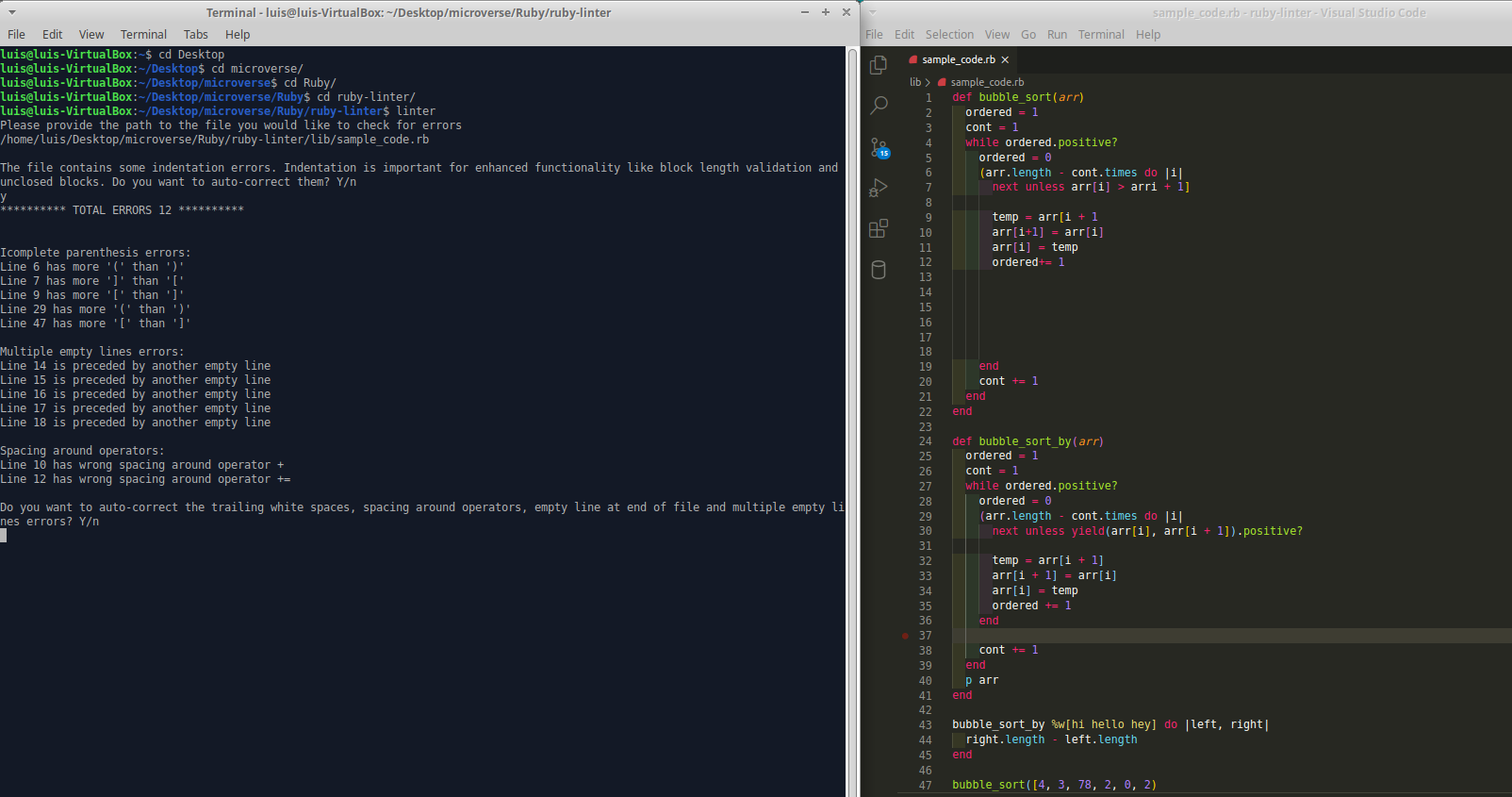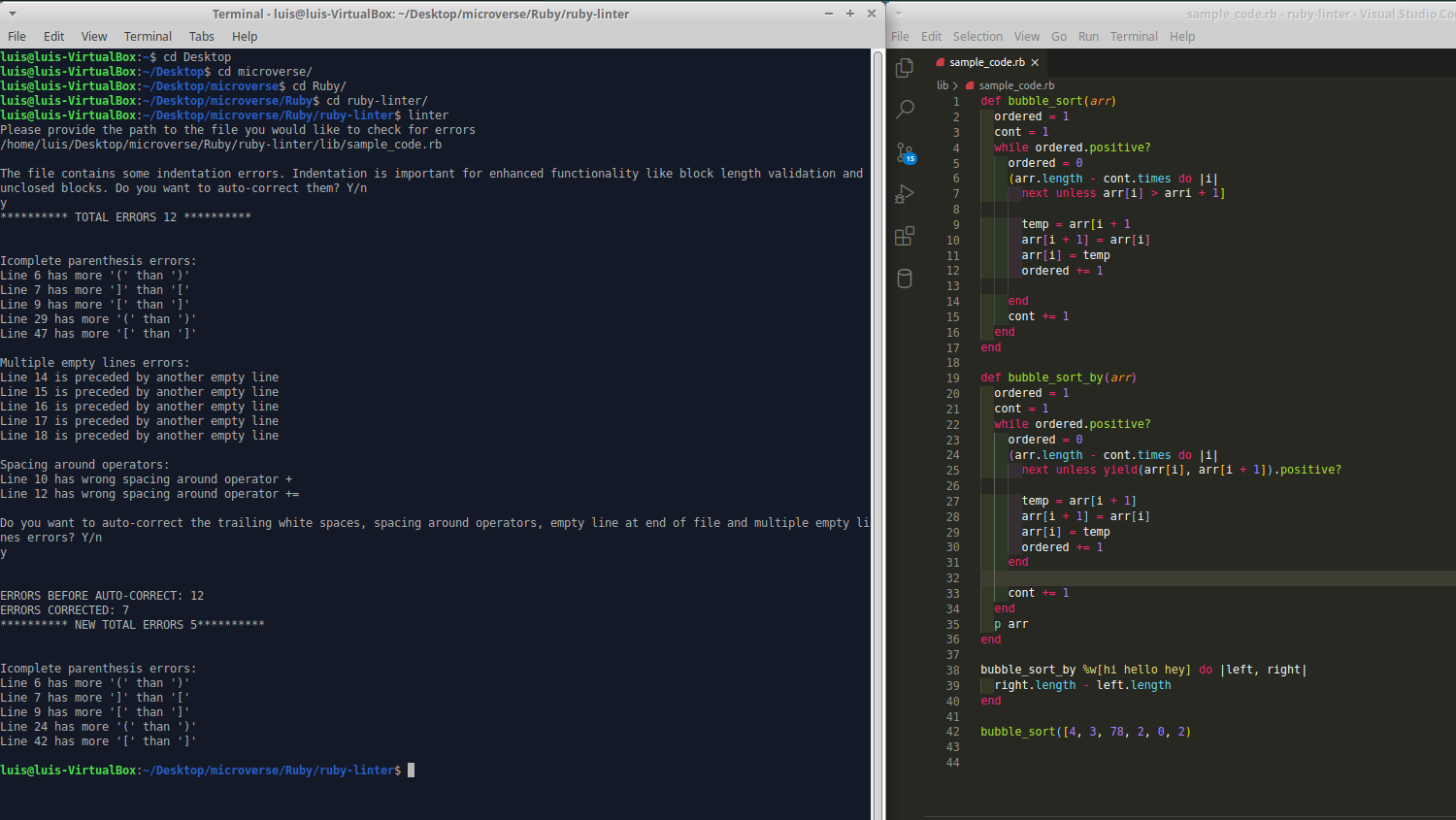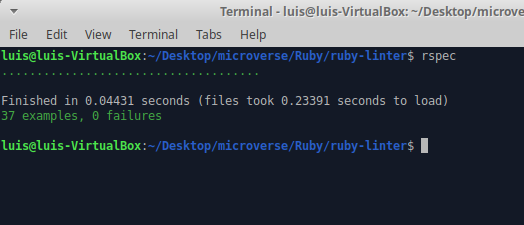The project's goal was to create a Linter to use in your everyday coding life. The Linter that here is described is for use on Ruby code. It provides feedback for:
- Line length.
- Blocks length.
- Class length.
- Indentation.
- Missing parenthesis/brackets/curly brackets.
- Lines with trailing spaces.
- Multiple empty lines.
- A missing empty line at the end of the file.
- Operator spacing.
- Unclosed block.
Additional to this, the linter allows you to auto-correct most of these style issues just by typing 'y'. I decided to build this linter since I was having a lot of style issues with my Ruby projects and files. I am convinced that there is a lot to improve on the current linter options, and I would like to contribute with my design and tools to make the life of programmers better.
This project includes the following files:
├── bin
│ ├── linter
└── lib
│ ├── modules
│ │ ├── file_validate.rb
│ │ ├── linter_module.rb
│ ├── errorhandler.rb
│ └── linterclass.rb
├── spec
│ ├── errorhandler_spec.rb
│ ├── file_validate_spec.rb
│ ├── linter_module_spec.rb
│ ├── linterclass_spec.rb
│ ├── spec_helper.rb
├── .gitignore
├── .rspec
├── .rubocop.yml
├── .stickler.yml
├── Gemfile
├── Gemfile.lock
├── README.md
- linter:
Contains the main executable file.
- file_validate.rb:
Module used to validate the file entered for evaluation is a valid file.
- linter_module.rb:
Provides functionality to look in strings for patterns that help determine certain mistakes. It mixes in with the String class.
- errorhandler.rb
Handles all the error messages and organizes them for the user to be able to find them easily.
- linterclass.rb:
Handles all the algorithms needed to find errors and correct them.
- Spec:
Folder containing all the tests by module/class with different edge cases to guaranty the correct functionality of the tool.
- .gitignore:
Ignores files used on development to test some edge cases.
- .rspec:
Helper for the tests to be able to run.
- rubocop.yml:
Standard Microverse style rule-set.
- Gemfile and Gemfile.lock:
Standard files used to run rubocop gem.
- REAME.md:
File containing these instructions and project structure.
The user can easily modify the rules of:
- Line Length
- Block Length
- Class Length
- Indentation
To fit each projects specifics. In order to do it, please go to:
$ cd /root-project-folder/
$ cd bin
Or you can go through your file navigator/finder to:
/root-project-folder/bin
Open linter file using the text editor of your preference.
Customize lines 5 - 8 with your personalized style.
Line length (Rule set at 20)
Bad code:
return this unless true
Good code:
unless true
return this
end
Blocks/Classes length (block length set to 16)
Bad code:
Good code:
Indentation. (indentation set to 2)
Bad code:
def something
return true if something_else
end
Good code:
def something
return true if something_else
end
Missing Parenthesis/Brackets/Curly Brackets
Bad code:
(x + y) * (z - w
Good code:
(x + y) * (z - w)
Lines with trailing spaces
Bad code:
Good code:
Multiple empty lines
Bad code:
end
if something...
Good code:
end
if something...
A missing empty line at the end of the file
Bad code:
end
Good code:
end
Operator spacing
Bad code:
(x +y)*(z- w)
Good code:
(x + y) * (z - w)
Unclosed block
Bad code:
def
some awesome code
if something ...
Good code:
def
some awesome code
end
if something
In order to use this linter, you will need to have the repo downloaded on your local computer. To achieve that please open your Terminal and type:
$ cd <local file where the file will be cloned>
$ git clone git@github.com:lmaldonadoch/ruby-linter.git
Or you can download the zip file directly by clicking on Download ZIP file after clicking on the Clone or Download button.
Once the folder is on your computer, please go to the root directory by typing the next command:
$ cd ruby-linter
Here, you can create an alias/softlink for the file so that you can run it from the root directory. To do that, please type the next commands:
On windows/Mac
$ ln -s $PWD/linter /usr/local/bin/
On Linux
$ sudo ln -s $PWD/linter /usr/local/bin/
Then you can run the file from the root directory
$ cd ruby-linter
$ linter
Please provide the path to the file you would like to check for errors
$ <path to file>
If you would not like to create an alias/softlink then you can just go into the bin folder and then run the linter like this:
$ cd ruby-linter
$ cd bin
$ ruby linter
Please provide the path to the file you would like to check for errors
$ <path to file>
You can get the path to file by going to your file directory and copying the path, or on your code editor right click on the file and then Copy Path. Then follow the instructions provided by the linter.
Please click here to view the video instructions.
Here are some screenshots on how it works:
Notice the indentation errors on lines 9 through 12 and 27 through 36. The first thing linter will show is is the indentation errors since some enhanced functionality depend on the correct indentation of the file. After we select 'y' to auto correct, this is what linter shows:
Notice the indentation is corrected, and now it shows us the style/functionality errors we are incurring in our code. The linter then gives us an option to correct automatically some of these issues for us.
After we select 'y' to autocorrect, notice how the style issues got corrected, and the functionality issues are kept so that the user can decide whether they are functionality issues or the mismatch was on purpose.
Please click here to view the video instructions.
The code was tested using RSpec. If you would like run the tests yourself please make sure you have RSpec installed on your local machine. To verify it you can open your terminal and type:
\$ rspec --version
If it does not show you a version of RSpect then please run the following command
\$ gem install rspec
To run the tests please go to the root file of the repo and run
\$ rspec
And the tests should show this:
If you would like to customize the tests, please type on your terminal:
\$ cd spec
And open the file you would like to run custom tests on.
Please click here to see the project specifics.
- Ruby
- VS Code
- RSpec gem
- Rubocop gem
- Stickler CI
- OOP (Object Oriented Programming) principles
- Classes and Modules
👤 Luis Angel Maldonado
- Github: @lmaldonadoch
- Twitter: @LuisAngelMCh
- Linkedin: lmaldonadoch
- Potfolio: www.lmaldonadoch.com
- Add a validation for conditionals, always use && over 'and', and || over 'or'.
- Add a validation for conditionals to warn users of miss-use of = signs when == is more appropriate.
- Make a Ruby Gem from my lint.
Contributions, issues and feature requests are welcome!
Contributions, issues and feature requests are welcome!
Feel free to check the issues page.
Give a ⭐️ if you like this project!
- Project inspired by Microverse Program. Please click here to see the original project specifications.
This project is MIT licensed.








